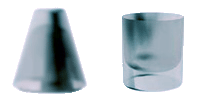Upside-down or Upside-up?
Living a life is a hard thing to do.
In the beginning, there were only two entities: either correct or wrong.
As we grow, we are exposed to wider and wider part of society.
We, in one way or another, were forced to interact.
The funny thing is that we are considered an adult, a "grown-up", when
our interaction becomes so complicated that we cannot directly see what
is correct and what is wrong.
Well, I went to a Buddhist talk one Friday and heard this nice little story.
It mentioned one of the ways to say what is right and what is wrong.
Being straight to the point after the long introduction, I ask this question:
How do you keep your glassware in a cupboard such that it won't get dusty?

|
Here are the alternatives:
-
Putting the glasses upside-down.
The reason is that dust falls down.
If we put glasses upside-up, they will be filled with dust and get dirty.
-
Putting them upside-up.
We can argue that the base of the cupboard is dirty with dust.
If we place them upside-down, the lip of the glasses will get dirty
due to contact with the dusty cupboard surface.
|
Which method do you choose? How do you justify your choice?
WAIT! Why do we have to choose? What is justification for?
In this case, our original goal was storing glassware. Does it really matter
whether we put them upside-down or upside-up? We can always clean them before
using, can't we? We don't need justification at all.
In general, we are usually blinded by pride. We take it for granted that
our way is THE correct way. But, consider this.
Which is more important: being correct or achieving the goal?
So, when should we argue to justify correctness?
If it concerns a principle, it will be appropriate to debate.
A principle is a principle. It must be carried out as it is.
On the other hand, if a principle is not concerned with, we'd better
to step out of the debate.
Consider the following condition.
A group of people was walking along a riverbank when they heard the sound:
"Quack! Quack!"
-
Assume the group of people was a class of young children with their teacher.
One of the children then said,
"Hey, it's a chicken! Isn't it, Teacher?"
A teacher's job is to tell the truth to students.
The teacher would say, "No, it's a duck, my boy!"
In this case, the teacher's being correct was important, so it's appropriate for
her to debate in case the child insisted.
-
Now, picture the group was a couple of husband and wife.
The wife then said, "Darling, it's a chicken."
The husband corrected, "No, Darling. It's a duck!"
But the wife insisted that it was a chicken.
In this case, the husband's being correct was not as important as maintaining
the romantic atmosphere of the presence of his wife at his side, so it would be wise
for him to step out of the debate, "Ah, yes! What was I thinking! Of course
it's a chicken!"
What is your answer now?
|
Any follow-ups, comments or objections to my view?
Contact me: at comp dot nus dot edu dot sg with dennyisk before the at
Last edited: Thursday, 3 May 2001
|
The material published on this Web page is personal, and is not endorsed by
or the responsibility of the National University of Singapore.
3D glass images were obtained from
Artel website
.
|
